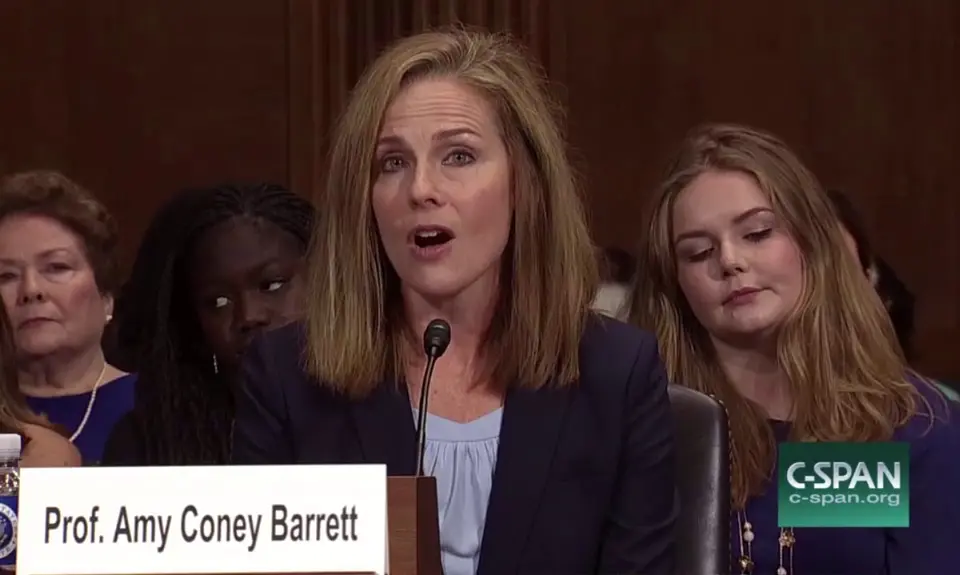It is very clear that the primary reason that Amy Coney Barrett should not be confirmed to the Supreme Court in the Trump-McConnell last-minute pre-election push is that her confirmation to replace the late Justice Ruth Bader Ginsburg would take away health care from millions of Americans during the current pandemic. Her record as a judge on the Seventh Circuit court of appeals reinforces these concerns.
Most decisions by the federal courts of appeals are unanimous, so looking at cases where a judge has chosen to disagree with and dissent from his or her colleagues can be particularly revealing. As reflected in PFAW’s report on her overall judicial record, that is the case with Barrett. Our report identified seven dissents in the three years she has served on the Seventh Circuit. These dissents show extreme views by Barrett in several areas, even as compared with the other judges on her court who were nominated by Presidents Reagan, Bush or other Republican presidents.
For example, take her dissent in Kanter v. Barr on gun safety. Two judges appointed by President Reagan affirmed the constitutionality of federal and state laws banning people convicted of felonies from possessing firearms. But Barrett dissented, claiming that such laws were unconstitutional, at least as applied to people convicted for non-violent felonies, or otherwise the Second Amendment would be treated as a “second-class right.” The majority made clear that it was not doing that, noted that history showed that the right to bear arms belonged only to “virtuous citizens,” and that the government had proved that prohibiting even those convicted of non-violent felonies from possessing firearms was “substantially related to its interest in preventing gun violence.” Every other federal appellate court that has considered the issue has upheld such laws, the majority pointed out, and one study has shown that even handgun purchasers with one prior misdemeanor conviction were “nearly 5 times as likely” to be charged with new offenses involving firearms or violence. But Barrett nevertheless dissented, in accord with extreme pro-gun special interests.
Or look at her June dissent in Cook County v. Wolf concerning immigration. The majority, including a judge nominated by President George H.W. Bush, affirmed a decision striking down a new Trump rule that bars immigrants from obtaining permanent resident status if they receive Medicaid, food stamps, or any other federal social safety net assistance. The majority explained that the rule was based on an improper interpretation of federal immigration laws, and essentially sets a “trap for the unwary” by “penalizing people for accepting benefits” that Congress expressly “made available to them.” Barrett’s dissent focused on the fact that the rule did not apply to permanent legal residents or “certain especially vulnerable populations” like refugees, but the majority pointed out that the proper focus was immigrants for whom the rule “is a restriction,” not those for whom “it is irrelevant.” Not that Barrett needed it, but her dissent could hardly have been a better audition to receive the Supreme Court nomination of anti-immigrant Donald Trump.
And what about her dissent in a criminal justice case involving suppression of evidence in Sims v. Hyatte ? Mack Sims was prosecuted for shooting a security guard based “almost exclusively” on the testimony of the guard himself. After Sims was convicted, he learned that the prosecution hid the fact that the guard had been hypnotized prior to the trial and, according to one witness, could identify Sims “only after hypnotism.” A state court and a federal district judge denied post-conviction relief, but another Republican-appointed Seventh Circuit judge wrote an opinion reversing the lower court, explaining that the result could well have been different if Sims’ lawyer had known about the hidden hypnosis. Barrett claimed in dissent that the court should have deferred to the state court’s view that the guard’s identification of Sims “never wavered,” but the majority responded that Barrett had failed to refute the conclusion that Supreme Court and other precedent “show beyond reasonable dispute that the prosecutor’s deliberate concealment of the hypnosis evidence” warranted post-conviction relief.
Barrett also joined two dissents in important cases concerning reproductive rights, further showing the threat she poses to such rights beyond her past criticism of Roe v. Wade. In Planned Parenthood v. Box, she joined a dissent from a decision that left in place a preliminary injunction against what was effectively a state requirement that those under 18 obtain parental consent prior to obtaining an abortion, contrary to Supreme Court precedent. Several Republican-appointed judges, including conservative Reagan appointee Frank Easterbrook and even Trump appointee Amy St. Eve, disagreed. In Planned Parenthood v. Commissioner, Barrett joined a dissent that argued, contrary to the initial decision by three Republican-appointed judges in the case, that a state should be able to prohibit an abortion based on why a person wants it—if it relates to the gender, race, or disability of the fetus. One of the judges who voted to invalidate the law in accord with Supreme Court precedent was conservative Reagan appointee Daniel Manion.
Other dissents by Barrett can be found in People For the American Way’s report, which makes clear that her nomination should be rejected because of the improper efforts by Trump and Senate Republicans to push it through the next president takes office and because of Trump’s anti- ACA and anti-Roe litmus test, which Barrett easily passes. Barrett’s dissents further show that she is an extreme nominee who is out of the mainstream, even when compared with other Republican-appointed judges.
